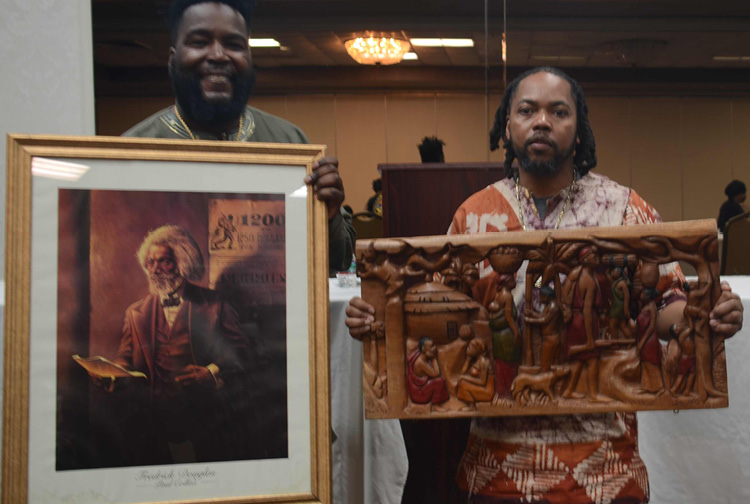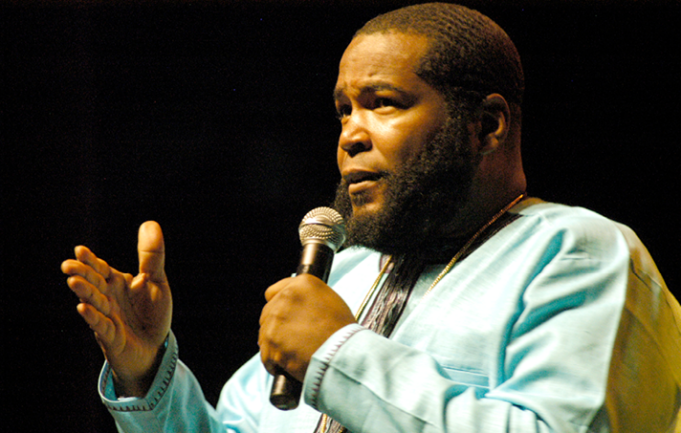Activist Bigga Dre, on right, presents gifts to Dr. Umar Johnson who spoke on January 12 in a Philadelphia suburb on issues relevant to the Black community. Photo: Michael Z. Muhammad
PHILADELPHIA—Dr. Umar Johnson, noted educational psychologist, captivated those in attendance with his powerful presentation at the Clarion Hotel in Essington, Pennsylvania, a suburb of Philadelphia, during the Martin Luther King weekend on January 12.
Philadelphia activist Bigga Dre orchestrated the symposium through his program, Eschatology (Bring Our Girls Back).
Dr. Johnson delved into critical topics significant to the Black community in a comprehensive and impactful presentation. The issues he covered included reparations, special education, and the harrowing reality of sex trafficking.
“Don’t let the idea of reparations hold us back from taking action. We are a community with a GNP (Gross National Product) of $2 trillion that shouldn’t just be waiting for Joe Biden to hand out checks. We spend billions on beauty products, designer sneakers, alcohol, and meat every year. It’s not productive to claim we can’t do anything without reparations. Let’s reject laziness, passivity, and inactivity.”
During his presentation, Dr. Johnson highlighted that the Black community often falls victim to distractions.
“You’d rather spend time enjoying yourself. And that’s the problem with Black folks. We love distractions. We are the most distracted people in the world. Black people always got time for something other than the right thing,” Dr. Johnson noted.
“Isn’t it amazing how we always commit time for anything that’s not important? We give anything detached from the African Revolution all the time in the world. But when it’s time to do something to uplift us as a people collectively, ‘I’m too busy for that,’ we say.”

His discussion also highlighted the daunting obstacles Black children in Philadelphia Public Schools face. “These schools notably experience one of the country’s highest rates of high school dropouts. Moreover, they rank in the top three for out-of-school suspensions and expulsions among Black boys,” he pointed out. Additionally, Dr. Johnson emphasized that the proportion of Black children receiving special education services far exceeds the national average.
He called Special Education the school-to-prison pipeline and argued that Special Ed was created to turn Black people into a permanent underclass.
“I want to be clear about something. 80 percent of the children in Philadelphia have IEPs, meaning they have a disability, meaning they are Special Ed students, and 80 percent of them don’t need Special Ed,” he said. They’re in there for laziness. This is why I believe that had I been in charge of Special Education in this city, we wouldn’t have diagnosed the children. We diagnose the homes they come from because they’re learning laziness from their parents. Show me a lazy child. I’ll show you a lazy household,” he argued.
“Why are our children struggling to succeed? It’s because we need to prioritize academic excellence in their education. Instead, we focus on extracurricular activities such as music, dance, and sports like football and basketball,” Dr. Johnson continued.
“We, as African people, have ignored the intergenerational psychopathology that exists in our community and our homes. An African proverb says that a nation’s ruin begins in its people’s homes. And for the life of me, I don’t understand why every Black person thinks that what goes on in your house is a private matter. What goes on in your house is not a private matter. How you raise your children will impact the community.”













